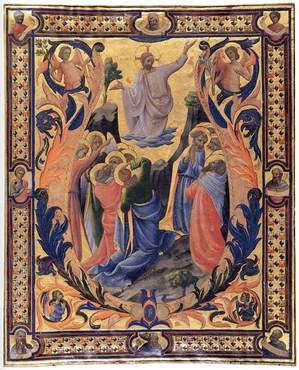 One of my missions in life is to help restore the use of liturgical sequences and the observance of octaves. The Liturgy of the Church is not only and primarily the worship of the Triune God but it also passes down to us what we believe and teaches us how to live. Well, I am not unique in wanting the restoration of sequences and octaves as others have similar ambitions. Care to join the "restore the sequence" effort? My friend Friar Charles at A Minor Friar reminded me of this work and he gives needed encouragement
One of my missions in life is to help restore the use of liturgical sequences and the observance of octaves. The Liturgy of the Church is not only and primarily the worship of the Triune God but it also passes down to us what we believe and teaches us how to live. Well, I am not unique in wanting the restoration of sequences and octaves as others have similar ambitions. Care to join the "restore the sequence" effort? My friend Friar Charles at A Minor Friar reminded me of this work and he gives needed encouragementMany of the sequences were excised, really abolished, from the Missal in the years following the Council of Trent and they were further reduced in number with the Missal of Paul VI. The 16th century redaction of the sequences seems to be based on Protestant criticism of medieval exegesis of Scripture and poetry in the Liturgy (sound familiar?). The Missal of Pope Paul made too many things optional and gave too many options; as you know, when human beings make things optional they become proscribed. Sadly, sequences are not in the liturgical framework of priests, liturgists or liturgical musicians; they're barely on the agenda of seminary courses in sacred Liturgy. Even the patrimony of the religious orders have no interest in liturgical poems of their venerable founders.
The Solemnity of the Ascension had a sequence --a liturgical poem set to music-- but it was jettisoned in the revision of the missal written by Adam of St Victor in the 12th century (d. c. 1177). Some have said that Adam of St Victor was the greatest poet of the Middle Ages (Gueranger) and the greatest Latin poet ever (John M. Neale). This is quite a claim of Digby S. Wrangham to make, but I'll leave it to others to parse the distinctions. Wrangham's collection of Adam's texts is noteworthy.
Adam of St Victor's text was translated into English by Digby S. Wrangham (which follows):
Spoliavit, ad superna Having spoiled, to joys supernal
Christus redit
gaudia; Christ returneth back once more:
Angelorum ascendenti As His upward way
he wendeth,
Sicut olim descendenti As before, when he descendeth,
Parantur
obsequia. Angels set them to adore.
Super astra sublimatur; As above the stars He goeth,
Non apparet, absentatur Here no more Himself He showeth,
Corporis praesentia; Bodily, to mortal sight;
Cuncta tamen moderatur, But all rule to him is given,
Cujus Patri coaequatur Who is with His Sire in Heaven
Honor et potentia. One in majesty and might.
Modo victor, modo tutus, Victor now, from perils warded,
Est in coelo constitutus He in heaven hath been accorded
Rector super omnia. Empire over all therein:
Non est rursum moriturus, Nevermore shall He be dying,
Nec per mortem mandaturus Nevermore through death supplying
Hominum contagia. Means to purify man's sin.
Semel enim incarnatus, Once for all He took our nature,
Semel passus, semel datus Once He suffered, once, a creature,
Pro peccatis hostia, Was for sin content to die:
Nullam feret ultra poenam, Further pain shall He know never,
Nam quietem habet plenam But, in perfect peace for ever,
Cum summa laetitia. Compass endless joys on high.
Cum recessit, ita dixit, Thus he spake, as He ascended;
Intimavit et infixit These things straitly He commanded,
Talia discipulis: And impressed upon His own:
"Ite, mundum circuite, "Go through all the world and preach ye,
Universos erudite Every nation therein teach ye
Verbis et miraculis. Both by word and wonder done.
"Nam as Patrem meum ibo; "For I go unto my Father,
Sed sciatis quod redibo: To return, as ye may gather,
Veniet Paraclitus Since shall come a Comforter,
Qui desertos et loquaces, Who shall make you bold and fearless,
Et securos, et audaces Of all consequences careless,
Faciet vos penitus. Eloquent in speech and clear.
Manus vestras imponentes, When ye lay your hands upon them,
Sanitatem dabitis; Shall their former health regain:
Universas res nocentes, All things hurtful and annoying,
Inimicos et serpentes With all deadly snakes, destroying,
Et morbos fugabitis. Ye shall drive out plagues and pain.
"Qui fidelis est futurus "Whosoever but believeth,
Et cum fide suscepturus And with simple faith receiveth
Baptismi remedium, Baptism's sure remedy,
In peccatis erit purus Shall be cleansed from all transgression,
Et cum justis habiturus And have with the saints possession
Sempiternum gaudium." Amen. Of eternal joys on high!" Amen.


Leave a comment